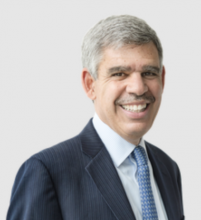You are here
Ensuring a stronger and fairer global recovery
Apr 10,2021 - Last updated at Apr 10,2021
CAMBRIDGE — An old joke about tricky trade-offs asks you to imagine your worst enemy driving over a cliff in your brand-new car. Would you be happy about the demise of your enemy or sad about the destruction of your car?
For many, the shape of this year’s hoped-for and much-needed global economic recovery poses a similar dilemma. Absent a revamp of both national policies and international coordination, the significant pickup in growth expected in 2021 will be very uneven, both across and within countries. With that comes a host of risks that could make growth in subsequent years less robust than it can and should be.
Based on current information, I expect rapid growth in China and the United States to drive a global expansion of 6 per cent or more this year, compared to a 3.5 per cent contraction in 2020. But while Europe should exit its double-dip recession, the recovery there will likely be more subdued. Parts of the emerging world are in an even tougher position.
Much of this divergence, both actual and anticipated, stems from variations in one or more of five factors. Controlling COVID-19 infections, including the spread of new coronavirus variants, is clearly crucial. So is distributing and administering vaccines,which includes securing supplies, overcoming institutional obstacles and ensuring public uptake. A third factor is financial resilience, which in some developing countries involves preemptively managing difficulties from the recent debt surge. Then come the quality and flexibility of policymaking, and finally whatever is left in the reservoirs of social capital and human resilience.
The bigger the differences between and within countries, the greater the challenges to the sustainability of this year’s recovery. This reflects a broad range of health, economic, financial and socio-political factors.
In a recent commentary, I explained why more uniform global progress on COVID-19 vaccination is important even for countries whose national immunisation programmes are far ahead of the pack. Without universal progress, leading vaccinators face a difficult choice between risking the importation of new variants from abroad and running a fortress economy with governments, households, and firms adopting a bunker-like mindset.
Uneven economic recoveries deprive individual countries of the tailwind of synchronised expansion, in which simultaneous output and income growth fuels a virtuous cycle of generalised economic well-being. They also increase the risks of trade and investment protectionism, as well as disruptions to supply chains.
Then there is the financial angle. Buoyant US growth, together with higher inflation expectations, has pushed market interest rates higher, with spillovers for the rest of the world. And there is more to come.
European Central Bank officials have already complained about “undue tightening” of financial conditions in the eurozone. Rising interest rates could also undermine the dominant paradigm in financial markets — namely, investors’ high confidence in ample, predictable and effective liquidity injections by systemically important central banks, which has encouraged many to venture well beyond their natural habitat, taking considerable if not excessive and irresponsible risks. In the short term, high liquidity has pushed cheap funding to many countries and companies. But sudden reversals in fund flows, as well as the growing risk of cumulative market accidents and policy mistakes, could cause severe disruptions.
Finally, uneven economic recovery risks aggravating the income, wealth, and opportunity gaps that the COVID-19 crisis has already widened enormously. The greater the inequality, particularly with respect to opportunity, the sharper the sense of alienation and marginalisation, and the more likely political polarisation will impede good and timely policymaking.
But, whereas the old joke hinges on the unavoidability of tough trade-offs, there is a middle way for the global economy in 2021 and beyond, one that maintains a robust recovery and simultaneously lifts disadvantaged countries, groups and regions. This requires both national and international policy adaptations.
National policies need to accelerate reforms that combine economic relief with measures to foster much more inclusive growth. This is not just about improving human productivity, through labour reskilling, education reforms and better childcare, and the productivity of capital and technology, through major upgrades to infrastructure and coverage. To build back better and fairer, policymakers must now also consider climate resilience as a critical input for more comprehensive decision-making.
Global policy alignment also is vital. The world is fortunate to have benefited initially from correlated, as opposed to coordinated, national policies in response to the COVID-19 crisis, with the vast majority of countries opting upfront for an all-in, whatever-it-takes, whole-of-government approach. But without coordination, policy stances will increasingly diverge, as less robust economies confront additional external headwinds at a time of declining aid flows, incomplete debt relief and hesitant foreign direct investment.
With the US and China leading a significant pickup in growth, the global economy has an opportunity to spring out of a pandemic shock that has harmed many people and, in some cases, erased a decade of progress on poverty reduction and other important socioeconomic objectives. But without policy adaptations at home and internationally, this rebound could be so uneven that it prematurely exhausts the prolonged period of faster and much more inclusive and sustainable growth that the global economy so desperately needs.
Mohamed A. El-Erian, president of Queens’ College, University of Cambridge, is a former chairman of US president Barack Obama’s Global Development Council. He is the author, most recently, of “The Only Game in Town: Central Banks, Instability, and Avoiding the Next Collapse”. Copyright: Project Syndicate, 2021.













